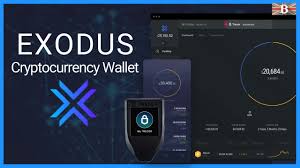In the ever-expanding world of cryptocurrency, having a exodus and easy-to-use wallet is crucial for both beginners and experienced traders alike. Exodus Wallet has emerged as a popular choice for managing various cryptocurrencies, offering an intuitive user interface, built-in exchange features, and robust security. This article will explore what makes Exodus Wallet stand out, its features, security protocols, and why it’s a favored option for digital asset management.
What is Exodus Wallet?
Exodus Wallet is a desktop and mobile cryptocurrency wallet that allows users to store, manage, and exchange a wide variety of digital assets. Launched in 2015, Exodus provides a seamless, user-friendly interface designed for individuals who want to safely store their cryptocurrency without the need for a complicated setup or technical knowledge.
Unlike some other wallets that require users to be familiar with complex blockchain terms or security practices, Exodus emphasizes simplicity and accessibility. Whether you’re holding Bitcoin, Ethereum, or numerous other altcoins, Exodus allows you to manage your portfolio in one centralized place.
Key Features of Exodus Wallet
1. Multi-Currency Support
Exodus Wallet supports over 100 different cryptocurrencies, including popular ones like Bitcoin (BTC), Ethereum (ETH), Litecoin (LTC), and many others. It also includes ERC-20 tokens, giving users flexibility when managing their portfolios. This wide range of supported assets makes Exodus a one-stop solution for most crypto enthusiasts, whether they are holding major coins or exploring lesser-known altcoins.
2. Built-in Exchange Feature
One of the standout features of Exodus Wallet is its built-in exchange. Users can exchange one cryptocurrency for another directly within the wallet without the need to use third-party services. This integration makes trading quick and convenient. The exchange supports assets like Bitcoin, Ethereum, Litecoin, and more, with real-time price updates to ensure you’re making informed decisions.
Exodus collaborates with several exchange partners, including ShapeShift, to provide this feature. The exchange service is free to use, though there are spread fees (which can vary based on market conditions). The simplicity of in-wallet trading makes it ideal for users who wish to manage their holdings without opening external accounts.
3. User-Friendly Interface
Exodus is known for its clean, sleek, and visually appealing design. The wallet’s interface is intuitive, even for beginners, allowing users to easily track their balances, view transaction history, and manage their assets. One of the unique aspects of Exodus is its interactive portfolio display, where users can visualize their holdings and portfolio performance with colorful charts.
The wallet also provides real-time market data, giving users a comprehensive view of cryptocurrency prices and trends. This all-in-one solution ensures that users can keep track of their investments without needing to rely on multiple applications or platforms.
4. Cross-Platform Compatibility
Exodus Wallet is available on both desktop and mobile devices, including Windows, macOS, Linux, iOS, and Android. This cross-platform functionality means users can access their crypto wallets from virtually any device, making it easy to manage assets while on the go.
For users who like to have a backup, Exodus also allows for syncing between different devices. This ensures that if you use both a desktop and a mobile wallet, your data stays up-to-date and consistent.
5. Backup and Recovery Options
Exodus offers multiple backup and recovery options for users to ensure their assets are safe. When setting up the wallet, users are prompted to write down a 12-word recovery phrase, which serves as a backup in case the device is lost or damaged. This recovery phrase is essential for regaining access to the wallet on a new device or after reinstalling the app.
Additionally, Exodus allows users to encrypt their wallets with a password, adding an extra layer of security for their funds. These built-in security features help safeguard against unauthorized access and give users peace of mind that their assets are well-protected.
Security Measures in Exodus Wallet
Security is a paramount concern in the cryptocurrency space, and Exodus Wallet takes several steps to ensure the safety of users’ funds.
1. Private Keys are Stored Locally
One of the key principles behind Exodus Wallet’s security is that private keys are stored locally on the user’s device, meaning they are never exposed to third parties or stored on centralized servers. This is a major benefit, as it ensures users retain full control over their private keys and, by extension, their cryptocurrency.
Since private keys are not stored online, this reduces the risk of hacking or other online threats. However, users must take care to back up their recovery phrase securely to avoid losing access to their wallet.
2. Encryption and Password Protection
Exodus allows users to set up a strong password that encrypts their wallet on the local device. This password is required to access the wallet and perform transactions, adding an extra layer of protection against unauthorized access. Even if someone gains physical access to your device, they will not be able to access your funds without the correct password.
3. Backup Phrase for Wallet Recovery
The 12-word backup phrase is one of the wallet’s most crucial security features. If your device is lost, stolen, or damaged, the backup phrase can be used to recover your funds on another device. It’s important to keep this recovery phrase in a secure, offline location—such as a safe or hardware wallet—to prevent unauthorized access.
4. Integration with Hardware Wallets
For users seeking an added layer of security, Exodus also supports integration with hardware wallets like Trezor. By connecting a Trezor hardware wallet to Exodus, users can store their private keys offline, which is considered one of the most secure ways to manage cryptocurrency. This adds another level of protection for individuals holding larger amounts of digital assets.
Pros and Cons of Exodus Wallet
Pros:
- User-friendly design: Exodus is perfect for beginners, with a simple and clean interface.
- Multi-asset support: With support for over 100 cryptocurrencies, users can manage a diverse portfolio.
- Integrated exchange: The in-wallet exchange feature makes trading quick and convenient.
- Strong security: Local private key storage, encryption, and backup recovery ensure robust protection.
- Cross-platform compatibility: Accessible on desktop and mobile devices, with syncing between platforms.
Cons:
- Not fully open-source: While Exodus has a strong reputation, some users may prefer a fully open-source wallet to ensure greater transparency.
- Fees on exchanges: While the wallet itself is free to use, trading within the wallet incurs spread fees, which could be higher than other exchanges.
- Limited advanced features: For advanced traders or users seeking more control over their private keys, Exodus might not offer enough customization compared to other wallets.
Conclusion
Exodus Wallet is a solid choice for cryptocurrency enthusiasts looking for an easy-to-use and secure wallet to manage their digital assets. With its intuitive design, wide array of supported assets, and built-in exchange feature, it’s perfect for both newcomers and experienced crypto investors. The wallet’s security measures, including local private key storage, password protection, and recovery options, provide peace of mind for users. Whether you’re holding a small number of coins or building a larger portfolio, Exodus offers a simple and effective solution for managing your crypto assets.




